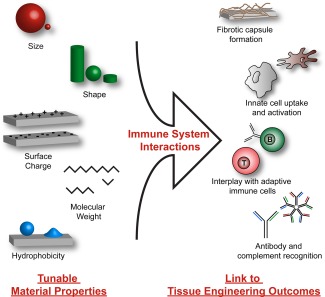Figure 1.

Intrinsic properties of materials influence immune responses. Biomaterials commonly used in vaccine, immunotherapy, and tissue engineering approaches exhibit features including size, shape, surface charge, hydrophobicity, and molecular weight that alter interactions with the immune system. Encountering components of the innate and adaptive immune system with these materials results in formation of fibrotic capsule to isolate the material, differential activation of dendritic cells and macrophages, recognition and removal by antibody and complement proteins, and even manipulating adaptive immune response
